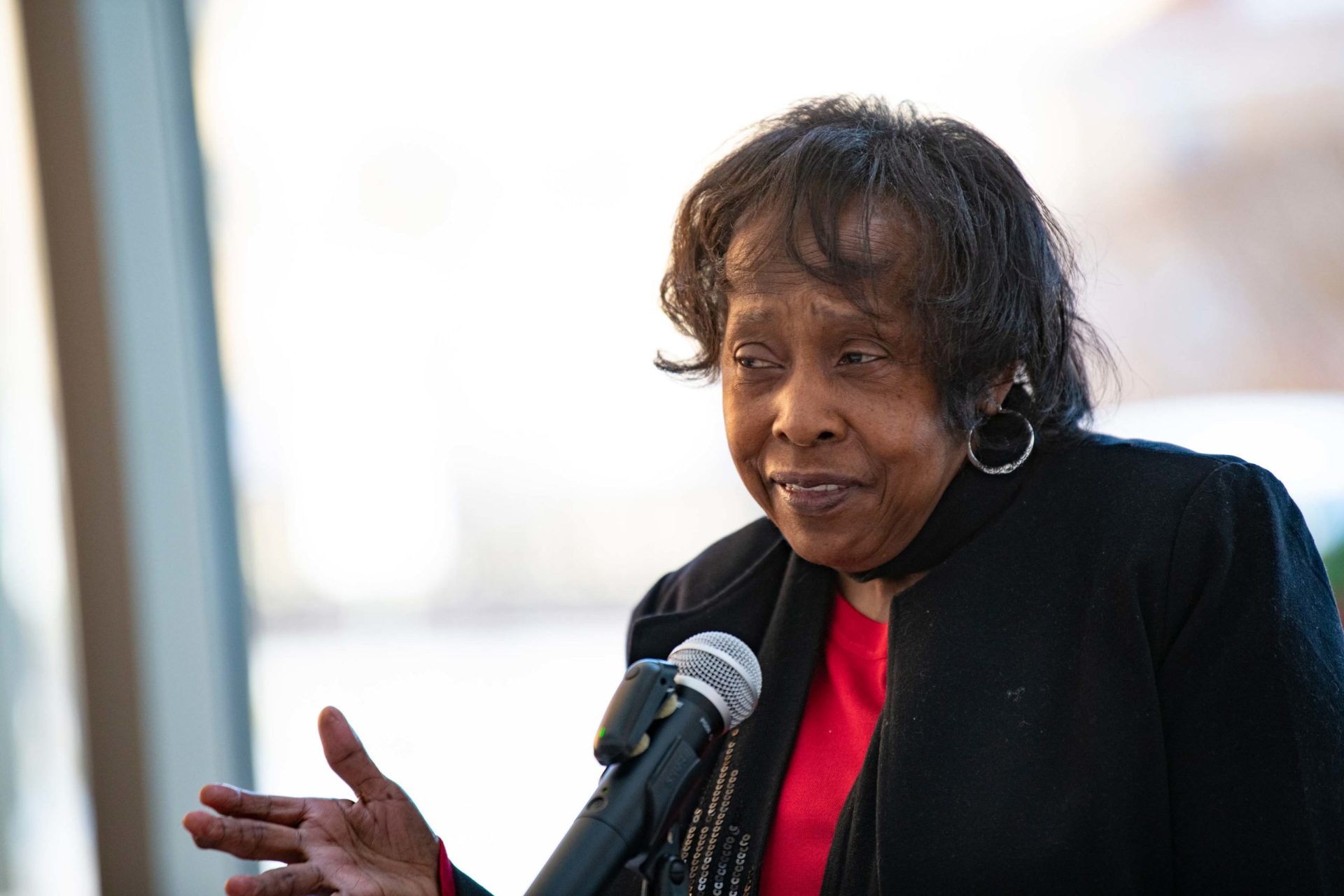MORRIS TURNER’S LEGACY IS EVERLASTING
On June 30, 2014, Dr. Morris Turner was called home. But seemingly everybody still remembers how special he was to his family, UPMC Magee-Womens Hospital, and the Pittsburgh community at-large.
So much so that on Feb. 15, nearly eight years after his passing, hundreds gathered at UPMC Magee-Womens Hospital in Oakland to celebrate the noted obstetrician-gynecologist with a portrait that will forever remain at the hospital. Those that knew him personally will look at the portrait and recall watching him in action. Those that didn’t know him will be introduced to him for the first time and can read the plaque dedicated to him which sits next to his portrait. The portrait and plaque are on the hospital’s second floor outside the Birth Center.

VERENA TURNER, the widow of Dr. Morris Turner, speaks during an unveiling of Dr. Turner’s portrait, Feb. 15, at UPMC Magee-Womens Hospital.
“Brilliant clinician and outstanding surgeon,” the plaque, dedicated by the medical staff at the hospital in 2016, reads. “Articulate and thoughtful leader. Distinguished colleague, teacher and mentor. Tireless healer who was devoted to the medically underserved of Western Pennsylvania. Dynamic past president of the medical staff.”
The portrait was completed by Pittsburgh-area artist Douglas J. Webster. Webster has the late Dr. Turner seated, in his trademark black suit, red tie, sporting glasses and his unmistakable smile.

MORRIS TURNER’S WIDOW, VERENA, sees the unveiling of the new portrait for her late husband, a highly regarded OB-GYN at UPMC Magee-Womens Hospital. The portrait unveiling was held, Feb. 15.
Dr. Turner, born in 1948 in Barley, Ga., won a scholarship to the University of Pittsburgh School of Medicine in 1969. Upon his graduation four years later, he began his residency program at Magee-Womens Hospital.
The world of helping others through medicine was a world Dr. Turner always cherished. As a child, he told his parents he wanted to become a doctor to help women and girls who died from childbirth or abortion. Following his graduation from a historically-Black college, Morehouse, in Atlanta, off to Pittsburgh he went.

DOUGLAS WEBSTER stands next to his portrait of Dr. Morris Turner.
Over the years, Dr. Turner became the medical director for the UPMC Magee-Womens satellite locations in Wilkinsburg and Monroeville, medical director for Adagio Health, and chief of service for obstetrics and gynecology at McKeesport Hospital. Dr. Turner also partnered with Dr. Robert Kisner in opening an outreach center in East Liberty, specifically focused on Pittsburgh’s Black community. He also served as president of the Gateway Medical Society.
In 2002, Dr. Turner joined the faculty of the OB-GYN department at Pitt’s medical school. In 2010, Dr. Turner received an Excellence in Clinical Instruction award at the medical school. That year is also when he was introduced to a third-year medical student, G. Sarah Napoe. At the portrait-unveiling ceremony on Feb. 15, it was now-Dr. G. Sarah Napoe who spoke to the assembled crowd about Dr. Turner.
“He was an amazing physician, a talented physician,” Dr. Napoe told the New Pittsburgh Courier. “But also someone who treated patients incredibly, no matter what their background was. He had that way of showing everyone respect.”
Dr. Napoe said she delivered her first baby with him as a medical student, and she also worked with him as a fourth-year medical student. She graduated from Pitt’s School of Medicine in 2012.
Dr. Napoe also recalled Dr. Turner’s unwavering desire to see more Black doctors, especially OB-GYNs. She said that with Black women in the U.S. three times more likely to die of complications from childbirth than White women, more Black doctors can help stress to Black women of their elevated risk.
“We know that this (disparity) is because of race because even when you look at socioeconomic status, it is still the same,” Dr. Napoe told the Courier. “Black women with a college degree are still more likely to have complications than a White woman with a high school degree.”
Dr. Turner’s awards were many, including being named a Courier “Man of Excellence” in 2012.
Dr. Turner was so dedicated to his profession that all of his comrades recall the blizzard of 1994 in Pittsburgh, where, knowing that a woman was at Magee-Womens Hospital with a baby on the way, Dr. Turner walked for more than an hour in the snow to get to the hospital.
On June 30, 2015, Dr. Turner was playing tennis when he suffered a cardiac arrest, and later died. He was 65.

Two weeks after his death, Pittsburgh City Councilmembers R. Daniel Lavelle and Dan Gilman sponsored a proclamation that Feb. 15, 2014, be named “Dr. Morris Turner Day” in the City of Pittsburgh. It passed with no hesitation.
During the City Council meeting on that day, Councilman Lavelle, with members of Dr. Turner’s family by his side, called Dr. Turner “a wonderful man who was very accomplished in the field of medicine.”
After the proclamation was read, Derrick Turner, one of Dr. Turner’s four children, called his father’s death “this city’s loss. He’ll be sorely missed.”
Councilman Gilman then added: “This is not just our city’s loss, this is our country’s loss. Dr. Turner was a champion for so many noble causes for women’s rights, the African American community, for justice and medical availability in all of our communities.”